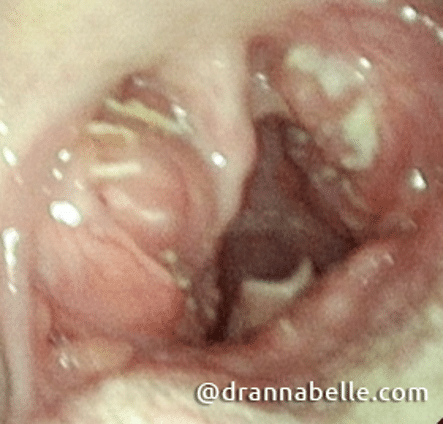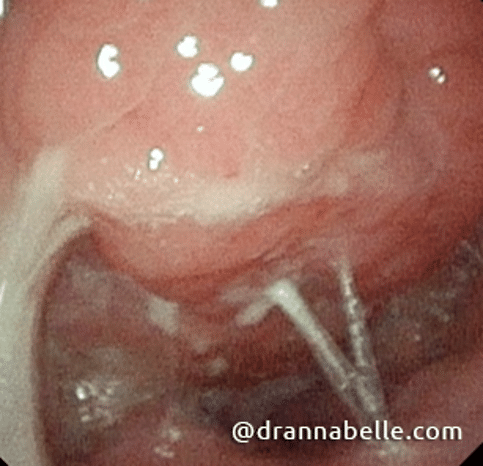Dr Annabelle Leong ENT
Have you suffered a severe sore throat with a blocked nose, making it difficult to breathe through your nose? You very likely have, as sore throats and blocked noses are extremely common ENT problems in both children and adults. As a busy ENT specialist in Singapore, we have many ill patients coming in to see us with tonsillitis, sinus infections and worsening of their nasal allergies.
Contents
A) SORE THROAT AND TONSIL INFECTIONS:
If you feel unwell with a bad sore throat, you may also be running a fever and/or have a cough. White spots on the back of your throat, especially on the sides of your throat, may be seen (Figure 1) and they are usually caused by infection, both viral and bacterial. Some patients with throat pain also notice the “glands” in their neck, may be painful and enlarged, due to inflamed lymph nodes draining the inflammatory fluid from the throat and nose sites. Sometimes, the sore throat due to tonsillitis may be part and parcel of the overall condition of glandular fever, also known as “the kissing disease” or more accurately, infectious mononucleosis.
Glandular fever or infectious mononucleosis is usually seen in young adults who may have caught it from crowded places such as living in dormitories at college or school. Although its name sounds scary, glandular fever isn’t actually infectious via air-borne particles, as it is mainly spread through saliva and bodily fluids. It is caused the Epstein-Barr virus (EBV) and hence, it is sensible advice NOT to share food or utensils or towels with the person who has caught glandular fever. EBV may also cause inflammation of the liver and spleen to cause abdominal discomfort and abnormal liver blood tests. So most importantly, if you are down with EBV glandular fever, you need to refrain from playing contact sports such as football, rugby and Mixed Martial Arts (MMA), as the liver and spleen are at much higher risk of rupture.
Tonsillitis or tonsil infections can be rather troublesome as some patients seem to improve on antibiotics and then as soon as they finish their medication, their tonsils flare up again with yet another acute infection. Tonsillitis may be caused by viral and/or bacterial infections: If you’re lucky, maybe it’s just going to be that one isolated episodes, sometimes triggered by recent flu, Covid infection or Covid vaccination. However, for many patients suffering recurrent sore throats due to tonsil infections, they just don’t seem to recover fully and keep suffering one sore throat after another. This really has a negative impact on your general health, falling sick all the time and having to take one course of antibiotic after another. Ultimately, if your tonsillitis and sore throats keep recurring, then it’s probably time to consider a tonsillectomy to remove the infected tonsils to prevent further throat infections. Having your tonsils removed does NOT affect the function of your immune system to fight infection, and actually, the opposite is usually true i.e. your general health improves tremendously once those nasty things are out!
Tonsillitis should not be considered as “just another normal sore throat”: It is often much more painful and serious, as the patient may not be able to drink fluids, running the risk of dehydrations, nor even swallow their oral tablets. Some patients need to be admitted into hospital for IV drips and medications to get better. 10% of tonsillitis patients do go on to develop complications such as a quinsy or peritonsillar abscess, where you can barely open your mouth due to the pain and swelling. If left untreated for longer, then the abscess, or collection of pus, will continue to enlarge and may spread to the airway and neck, now making this a surgical emergency as it will be difficult to breathe and swallow.

Figure 1: Infected swollen tonsils covered in cheesy pus, causing severe throat pain, fever and difficulty swallowing. Severe tonsillitis may also lead to abscess formation, called a quinsy, which needs the trapped pus fluid drained urgently.
B) PERSISTENT BLOCKED NOSE, CHRONIC COUGH AND CONSTANT THROAT-CLEARING
If you constantly have the annoying habit of clearing throat multiple times with the “ahem ahem” noises, you may also be suffering a frequently blocked nose with itchy throat and chronic cough. So why do these irritating symptoms happen? Your family and friends are probably sick of hearing you make those awful grating throat sounds: “You sound like an old man!”
Well, nasal allergies, sinus infections and enlarged inflamed adenoid tissue stuck at the back of your nose may all be leading to your horrid throat and nose problems. Sometimes, a viral infection, which doesn’t always have to be Covid, may also trigger the growth of inflamed lymph gland tissue in a reactive manner. The adenoids are located at the back of your nose, just as your tonsils are situated at the back of your throat. The difference is, you can’t see your adenoids at all except when a special camera or nasoendoscopy is used to examine your nasal passages. Adenoids are commonly enlarged in the young child but they are supposed to naturally reduce in size or shrink as children grow older, so most adults really have hardly any adenoid tissue remaining at the back of their nose.
If the adenoids are infected, they may temporarily improve with a course of antibiotics but if they remain excessively enlarged, they stand a high chance of becoming infected yet again as “adenoiditis” (Figure 2), resulting in a heavy thick sticky postnasal drip or backdrip from the back of your nose down into your poor throat. When that heavy infected backdrip reaches your voicebox, this will stimulate the cough reflex, a way for your voicebox to try to prevent the slimy mucus from entering your lower airways into your lung to cause bronchitis and/or an asthma attack. Remember, if you suffer from asthma or hypersensitive lower airways, you most definitely should have your upper airways (nose and throat) carefully checked out for allergic rhinitis, sinus infections and/or enlarged infected adenoids which are causing the persistent infected backdrip to flow into your lower airways.

Figure 2: Enlarged inflamed adenoids covered in sticky secretions, causing a persistent cough, blocked runny nose and snoring.
Sometimes, it’s worth trying Sinus rinse to irrigate your nasal passages, as well as a short course of nasal and oral steroids with decongestant medications to calm down your nose and hopefully reduce the persistent backdrip. A course of antibiotics is also sensible if you haven’t tried this option yet. If all else fails, then a CT scan of your sinuses may be helpful to investigate the source of chronic infection. Surgical drainage of your sinuses and/or removal of your inflamed enlarged adenoids (via a safe melting technique called coblation) may be able to treat your persistent symptoms definitively.

